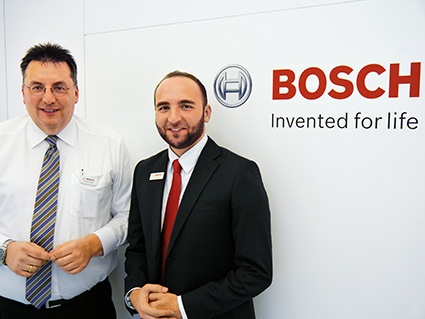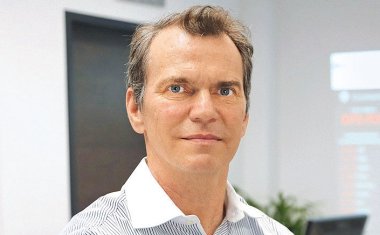A Great Market for Heavy-duty Security Equipment
There are some characteristics for the Middle East market that are obvious. High temperatures and the harsh environment with dust, sand and often sea-water filled air is nothing st...

There are some characteristics for the Middle East market that are obvious. High temperatures and the harsh environment with dust, sand and often sea-water filled air is nothing standard equipment is made for. But there is more to reflect that sets the ME market apart from others. At Intersec in Dubai, Heiko Baumgartner had the chance to talk to two experts for this market, Hanno Vogels, Vice President Sales and Business Development for Eastern Europe, Middle East and Africa, and Baraa Dakhel, Regional Manager Business Development Middle East at Bosch Security Systems.
GIT-SECURITY.com: Apart from regional aspects, what trends do you see in the video security market?
Hanno Vogels: The move to IP that has determined the market in the last few years is unbroken. From what we see today the break-even of IP video versus analog has finally arrived. For new projects we see the vast majority of projects now built on an IP basis and there is a strong trend towards HD video, too.
Is this the case also for the Middle East?
Baraa Dakhel: Yes, since several years our customers in the Middle East are looking for investments in high performance systems and therefore almost every new project relies on IP video systems. HD video is in the center of the interest, and thanks to the fast pace HD technologies are developing at, even traditional challenges like low light conditions and bandwidth constrains are now being solved in the latest generation of HD cameras.
Are the customers in the Middle East region more demanding?
Hanno Vogels: Certainly the majority of our customers have a very clear view on what they want. They are looking for great quality, high performance and absolutely reliable systems. One of the reasons why they are looking for especially reliable solutions are the harsh environmental challenges, security solutions face in this regions. We have for example good success with our video surveillance products that are built for very harsh weather conditions.
Do they trust famous brand when they decide between systems from different vendors?
Baraa Dakhel: To represent a brand with a good reputation is of course a great basis to start with but what differentiates this region from other parts of the world is that customers here often compare different products not only based on data sheets but also based on rigid testing. They appreciate to see the products demonstrations at the vendor's production facility but also want additional on-site testing without any preconditioning, just out of the box.
Hanno Vogels: At Bosch we have the opportunity to invite customers to our facilities and laboratories in Eindhoven or Munich, where they can get a good view on our products and can test them. Sometimes this is just not enough and we prepare on-site demonstrations to convince the customer that the products meet the customer's demands and specifications in the real world.
Are there other things that are typical for the ME market?
Baraa Dakhel: A big difference is data storage. While in some parts of Europe the storage of video data is limited to one or two days, in most countries in the Middle East regulations call for storing the data for long periods up to 120 days in some cases. This means that for big installations you need to store hundreds of terrabytes of video data reaching to petabytes. You can really speak of "big data". Therefore the careful use of bandwidth and efficient data storage are especially important in this market.
Hanno Vogels: Another characteristics of the Middle East market is that video analytics is often used to enhance security. When they talk about video analytics our customers are not limited to basic analytics like detection of movement or people counting but real-time analytics on the next level. With our systems up to eight different video analytic modes are available. Behavior analysis like it is used for crowd detection or to analyze the behavior of people around ATM machines are just two examples of the kind of video analytics how it is used in this market.
How do you handle video analytics? Do you work with software vendors that provide video analytics?
Hanno Vogels: This is one option. The work we did together with our VMS partners to deeply integrate our cameras has already paid off. We often use technology that is built-in into our systems. Here we really get good synergies from developments in other Bosch departments like the automation sector. Systems and algorithms they have developed together with car companies on a big scale can be implemented in our solutions. One example is electronic driver support where the situation in a fast moving car is constantly analyzed with very low failure rates allowed. This means that the systems are very reliable and work under very demanding conditions like day/night environments or at high speed. We use the technologies developed in this field and place intelligence within the camera and we store the meta data. This helps to analyze video data after it is stored and makes a search for objects or patterns in a forensic search much faster.
You mentioned that regulations in the ME change the demands in this market. Apart from the regulated market, how open for innovative ideas are customers here?
Baraa Dakhel: A lot of our customers are very open to new technology. They want to be first-movers and embrace new ideas. If you can demonstrate that new technology is reliable and works on-site nobody stops you because of old-school thinking like "we have always done things this way". There are a lot of examples where we even co-developed new solutions together with our customers.
How does Bosch approach the Middle East market? Are you going through distributors and system integrators or are there also projects managed directly with the end-users?
Hanno Vogels: What sets this market apart is the size of the projects. We have worked on some real big projects where Bosch Security Systems was directly involved with the customer in close cooperation with our system integration partners via our Engineered Solution Business. Dubai airport is one example where Bosch over the years has worked together with several system integrators.
Baraa Dakhel: Just to give you an impression of the size: We have for example provided more than 1,500 cameras to secure one of the most prestigious land mark towers in Dubai and a complete turnkey video surveillance system with more than 4,000 cameras to secure a leading University in Saudi Arabia
In which verticals do you see the biggest demand for video security?
Hanno Vogels: The transportation and education sector is very important in this region and for the future we will see also more safe city projects. A great advantage is that in the ME region, we can use the brilliant fiber optics backbone for data transmission. Unlike in some parts of Europe, there is no need to hugely invest in IT infrastructure first.










